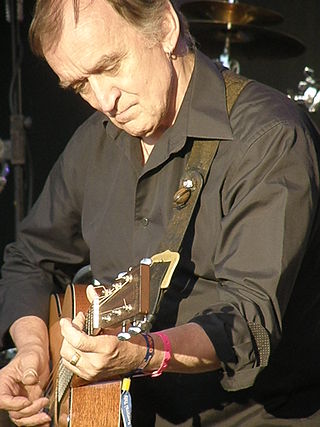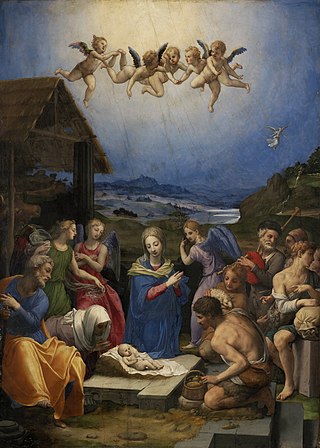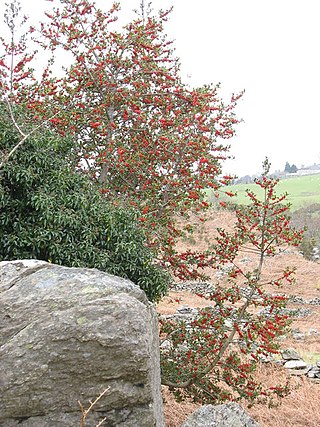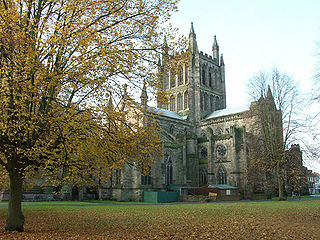
The Ditchling Carol is a Christmas carol and Roud song #3216, with words by William Robert Spencer. [1]

The Ditchling Carol is a Christmas carol and Roud song #3216, with words by William Robert Spencer. [1]
In the sleeve notes to the 1999 album Broken Ground by Waterson–Carthy, singer and guitarist Martin Carthy writes:
The Ditchling Carol is nowhere near as old as it might appear at first glance. According to Vic Gammon, “… the music is reputedly the work of a shoemaker and church musician called Peter Parsons who was from Ditchling near Brighton and who died in 1901 … Ditchling was quite a centre for musicians from the old church bands, and the choir itself did quite extensive pre-Christmas carol tours which were apparently very popular but were said to have been frowned on by church reformers who did not like them taking their music to other places …” [2]
In the sleeve notes for the 2011 CD Nowell Sing We, the New Scorpion Band note that the words are by William Robert Spencer and were published in 1811. They say "The setting is by Peter Preston, and the carol as we have it now was collated by Vic Gammon from several Sussex manuscripts. Here we perform it as a 'west gallery' piece." [3] [4] [5]

Martin Dominic Forbes Carthy MBE is an English singer and guitarist who has remained one of the most influential figures in English folk music, inspiring contemporaries such as Bob Dylan and Paul Simon, as well as later artists such as Richard Thompson, since he emerged as a young musician in the early days of the folk revival in the UK during the 1960s and 1970s.

Eliza Amy Forbes Carthy, MBE is an English folk musician known for both singing and playing the fiddle. She is the daughter of English folk musicians Martin Carthy and Norma Waterson.

The Watersons were an English folk group from Hull, Yorkshire. They performed mainly traditional songs with little or no accompaniment. Their distinctive sound came from their closely woven harmonies. They have been called the "most famous family in English folk music".

"Hark! The Herald Angels Sing" is an English Christmas carol that first appeared in 1739 in the collection Hymns and Sacred Poems. The carol, based on Luke 2:14, tells of an angelic chorus singing praises to God. As it is known in the modern era, it features lyrical contributions from Charles Wesley and George Whitefield, two of the founding ministers of Methodism, with music adapted from "Vaterland, in deinen Gauen" of Felix Mendelssohn's cantata Festgesang.
"The First Nowell", modernised as "The First Noel" ", is a traditional English Christmas carol with Cornish origins most likely from the early modern period, although possibly earlier. It is listed as number 682 in the Roud Folk Song Index.

Norma Christine Waterson was an English singer and songwriter, best known as one of the original members of The Watersons, a celebrated English traditional folk group. Other members of the group included her brother Mike Waterson and sister Lal Waterson, a cousin John Harrison and, in later incarnations of the group, her husband Martin Carthy.
"We Wish You a Merry Christmas" is an English Christmas carol, listed as numbers 230 and 9681 in the Roud Folk Song Index. The famous version of the carol is from the English West Country.

"The Holly and the Ivy" is a traditional British folk Christmas carol, listed as number 514 in the Roud Folk Song Index. The song can be traced only as far as the early nineteenth century, but the lyrics reflect an association between holly and Christmas dating at least as far as medieval times. The lyrics and melody varied significantly in traditional communities, but the song has since become standardised. The version which is now popular was collected in 1909 by the English folk song collector Cecil Sharp in the market town of Chipping Campden in Gloucestershire, England, from a woman named Mary Clayton.

Kathryn Williams is an English singer-songwriter who to date has released 14 studio albums, written and arranged for a multitude of artists, and was nominated for the 2000 Mercury Music Prize.

Coope Boyes and Simpson was an English vocal folk trio, formed around 1990. Their sound was rich and often had unusual vocal harmonies.

The "Boar's Head Carol" is a macaronic 15th century English Christmas carol that describes serving a boar's head at a Yuletide feast. Of the several extant versions of the carol, the one most usually performed today is based on a version published in 1521 in Wynkyn de Worde's Christmasse Carolles. A modern choral arrangement by Elizabeth Poston (1960) is also widely performed.
Here We Come A-wassailing, also known as Here We Come A-Christmasing,Wassail Song and by many other names, is a traditional English Christmas carol and New Year song, typically sung whilst wassailing, or singing carols, wishing good health and exchanging gifts door to door. It is listed as number 209 in the Roud Folk Song Index. Gower Wassail and Gloucestershire Wassail are similar wassailing songs.

Holy Heathens and the Old Green Man is an album by Waterson–Carthy.
Nowell Sing We Clear is a previously four-member musical group that performs an annual yuletide concert series. They have also released a series of related albums.

"Masters in This Hall" is a Christmas carol with words written around 1860 by the English poet and artist William Morris to an old French dance tune. The carol is moderately popular around the world but has not entered the canon of most popular carols.

Fantasia on Christmas Carols is a 1912 work for baritone, chorus, and orchestra by the English composer Ralph Vaughan Williams.
Shepherds Arise! Be Not Afraid, often known simply as Shepherds Arise, is a Christmas carol first recorded in a 19th-century manuscript from the parish of Winterborne Zelston, Dorset, England. It has Roud number 1207.
"Sir Christèmas" is a traditional British Christmas carol. The song's lyrics and melody are by an unknown author, with the first record of the song in the Ritson Manuscript, dating the song to some point before 1510.

George "Pop" Maynard was an English folk singer and marbles champion. The folk singer Shirley Collins considers Maynard to have been the "finest traditional English singer, matched only by Harry Cox".
Nowell Sing We may refer to: